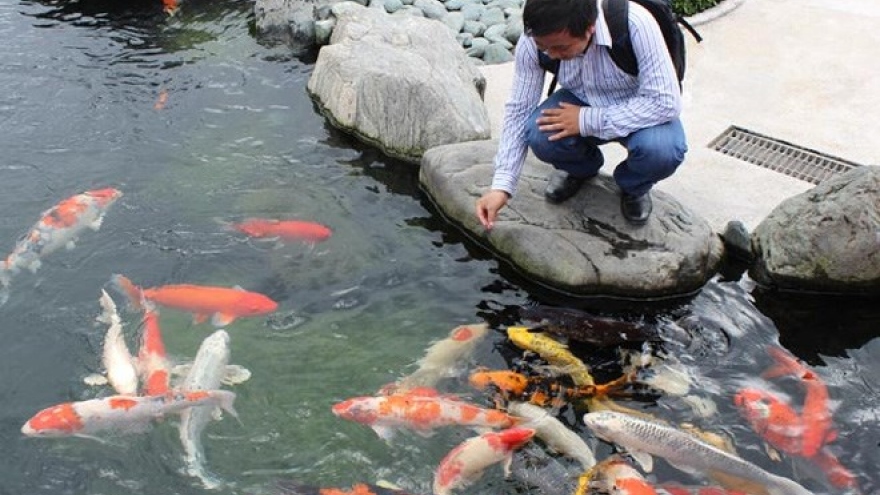HCM City casts a bigger net for ornamental fish market
VOV.VN - The niche freshwater ornamental fish farming segment of the aquaculture industry in the city and surrounding region has been growing steadily over recent years, says the Ho Chi Minh City People’s Committee.
 |
Ornamental fish are aquatic animals kept in an aquarium including fish, invertebrates such as corals, crustaceans (crabs, hermit crabs, shrimp), molluscs (snails, clams, scallops), and also live rock.
Live rock is a general term for any type of rock encrusted with, and containing within its orifices, a wide variety of marine organisms including algae and colourful sessile invertebrates.
The principal biological and chemical filter in many marine-type tanks is comprised of live rock, which in combination with the encrusted organisms provide the majority of the background colouration in the tank.
At a recent Committee meeting, members said the total production of ornamental fish in the city stood at, “roughly 13 million fish last year with gross sales touching US$12 million, more than double the figure for 2014.”
Currently, there are right at 10 sizable businesses in the city, which dominate the market, they said. These companies ship product to approximately 47 countries with a customer base located in Europe, America, Asia and Africa.
The vast majority of ornamental fish in the aquarium trade is of freshwater (as opposed to marine) origin and farm-raised. In the US ornamental fish are farmed principally in Florida.
Other countries that have traditionally been major actors in the industry segment specializing in breeding and propagation are Thailand, Indonesia, Singapore, China (including Hong Kong), Malaysia, and Japan
In particular, they said, “there is both a need and opportunity for greater involvement of women in this segment of the local economy.”
“Despite the promising progress to date, ornamental fish production is still relatively small in relation to its full potential with the collective global market share of farmers and others in the city a mere 1%,” they said
“Further impeding the development is the lack of coordination among industry leaders.”
Though no exact figures exist, according to the best available figures from the United Nations Food and Agriculture Organization, the world market value of ornamental fish trade tallies in at around US$278 million annually.
However, domestic and foreign sales of ornamental fish have barely scraped the surface of its potential and this is a fantastic time for some local farmers to get in on a ground floor opportunity in a niche market.
At the conclusion of the meeting, they adopted a far-reaching plan that set its sights on producing 40-50 million ornamental fish by 2020 with a gross sales target of somewhere in the range of US$40-50 million.
One member of the Committee said to develop the segment, it is important the city has a consistent supply of competitively priced fish. “This means developing a cadre of breeders with sufficient capacity to stock the farms, and keeping input costs low.”
“It is particularly crucial to keep the cost of energy constrained.”
Additionally, another member emphasized the need for a central export facility that can consolidate production and provide for the quality control, volume and packing efficiency necessary for large scale commercial export.
This member also pointed out the city needs to address other issues, such as management of disease and traceability, which involve providing a transparent and credible system for managing quality, preventing disease, and tracing origin.
Lastly the committee members with near unanimity agreed to establish a website dedicated to advancing the ornamental fish segment of the fishing and aquaculture industry and coordinate marketing effort with that of other industries within the city.

